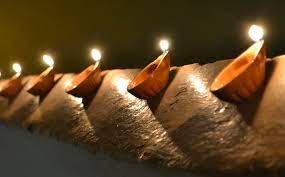 From the outset of this parable, it is helpful to understand that the oil lamps (in the Gospel) were not like what we know today as hurricane lamps. There was no glass chimney, no neat wick or adjusting device, and no attached tank in which oil would be stored. It was more like a large, flat, bowl, with a rag or rope-like “wick.” This kind of lamp could be attached to a pole and used as an outdoor torch to light one’s way. And erase from your mind the idea that the five foolish virgins ran out of oil. The text is clear on this point; the five foolish virgins never brought any oil with them. Otherwise, how would all five have run out at the same time?
From the outset of this parable, it is helpful to understand that the oil lamps (in the Gospel) were not like what we know today as hurricane lamps. There was no glass chimney, no neat wick or adjusting device, and no attached tank in which oil would be stored. It was more like a large, flat, bowl, with a rag or rope-like “wick.” This kind of lamp could be attached to a pole and used as an outdoor torch to light one’s way. And erase from your mind the idea that the five foolish virgins ran out of oil. The text is clear on this point; the five foolish virgins never brought any oil with them. Otherwise, how would all five have run out at the same time?
Keep in mind that these ladies were the BRIDE’S maids. All ten would have waited for the groom to come to the bride’s house. But this groom dallied, eyelids grew heavy, time passed, and darkness set in. Suddenly the cry is heard: “He’s coming, he’s here!” But now it’s midnight and it’s pitch dark. Everyone scurries to their light lamps.
When the five foolish virgins realized their plight, they ask the five wise virgins to share their oil, but their request is denied. It wasn’t that the five wise virgins didn’t care; it was because they reasoned that it would be better to have a torchlight parade with five working lamps than with ten non-functioning, lightless, lamps. So, in the absence of five dancers looking for more oil, the torchlight parade took place. The groom, accompanied by the five wise virgins entered the celebration hall. The doors were then closed so that when the foolish virgins arrived with their new supply of oil it was too late. Jesus concludes the parable by applying it to His disciples (and thus to us and to the church). He urges His disciples to stay alert, because they do not know the day or the hour of His return.
Let’s consider a contemporary example of what’s happening here. The best I’ve come up with is printer cartridge ink. Modern day copiers warn us well ahead of the moment of critical need with a message: “prepare a new toner cartridge.” But still we wait, coaxing every drop of ink even as the copies grow progressively fainter. We wait until, like the printer without ink says, “Amen, that’s it – no more copies.”
We can lull ourselves into thinking that there is still plenty of time for dealing with problems, enriching our prayer life, showing gratitude, expressing compassion. False confidence has gotten many people into trouble. Those who think they will have other chances to come to faith in Jesus are making a very dangerous assumption. The coming of our God may well be sudden and unexpected, when we are least ready. We do well to pay heed to the words of the Gospel Acclamation, “Stay awake and be ready! For you do not know on what day your Lord will come.”
When you travel southward along I-275 through Tampa you had best be alert to the signage: “Check gas – long bridge ahead.” This Gospel story could have been titled: “Check ink level – no back up cartridge on hand.” “Dancers, check oil – long night ahead!”
~Reflection by Sister Roberta Bailey, OSB




